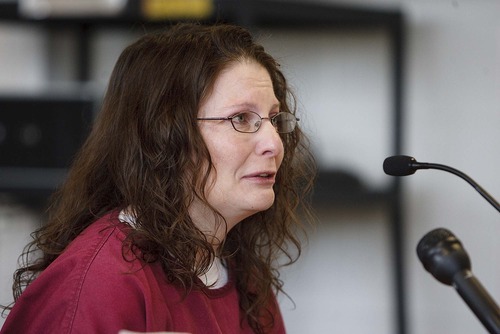This is an archived article that was published on sltrib.com in 2012, and information in the article may be outdated. It is provided only for personal research purposes and may not be reprinted.
A woman who killed her adopted daughter by forcing her to drink more than a gallon of water as a punishment walked out of the Utah State Prison on Tuesday morning, nearly six years after she was sent there.
Jennete Killpack, 36, was released from the prison about 9:30 a.m., a Department of Corrections spokesman said. She was sentenced in January 2006 to up to 15 years for the death of 4-year-old Cassandra Killpack, who died in June 2002 of "water intoxication."
Killpack forced the girl to drink the water to punish her for sneaking a drink of her baby sister's juice.
"I was cold," Killpack told the Utah Board of Pardons and Parole at a hearing last year. "I realized I'd entered into a power struggle and I was told [by therapists] it was important not to lose a power struggle."
At trial in 2005, witnesses testified that on other occasions Killpack had bitten the child's face, choked her and hit her hard enough with metal spoons to cause her to bleed.
Medical experts said that the excessive water Cassandra was forced to drink affected her sodium levels, causing her brain to swell.
Killpack was convicted by a 4th District Court jury of second-degree felony child abuse homicide.
Her husband, Richard Killpack, who was at work when most of the abuses took place, was acquitted of the same charge.
At last year's parole hearing, Richard Killpack pleaded with the Board of Pardons for his wife's release, saying she needed to be home to raise her four biological children.
"I try to help," he said, "but I'm a bumbling father who doesn't understand teenage girls."
The Springville couple could not be reached for comment Tuesday.
The Killpacks' attorneys claimed the water was a part of a treatment designed to help the child overcome a reactive attachment disorder.
To help the girl bond with her adoptive mother, Jennete Killpack was to provide the girl with all her food and drink and a therapist had recommended forcing the child to drink more, defense attorneys said.
On appeal, attorneys for Killpack said parents had the right to treat the child with methods other than psychiatry and drugs. But the Utah Supreme Court in 2008 upheld Killpack's conviction, ruling that nothing in the law concerning parents' rights to choose how to raise their children "can be construed as a defense against child abuse."
Board of Pardons spokesman Jim Hatch said Tuesday that board members "struggled a great deal" in deciding how much time Killpack should serve, ultimately settling on six years despite sentencing guidelines suggesting she serve four years.
"Despite the tragic nature of this crime, the Board concluded she could be safely paroled back into the community," Hatch said in a statement. "After committing the crime in 2002, Ms. Killpack had custody of her other children for over three years, without incident, before beginning her prison sentence. This demonstrated lack of on-going risk. The Board also concluded she did not intend this child's death, and while extremely reckless and dangerous, she was following the advice of so-called experts in meting out punishment."
Hatch called Killpack a "model inmate who showed great remorse" and said prison staff recommended her release. Board members also considered her lack of criminal history and the "widespread" community support for the woman, Hatch said.
"Her other children have suffered while she's been incarcerated and her husband pleaded for her to come home," Hatch said.



